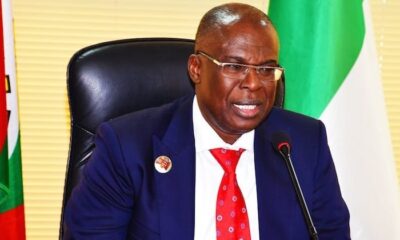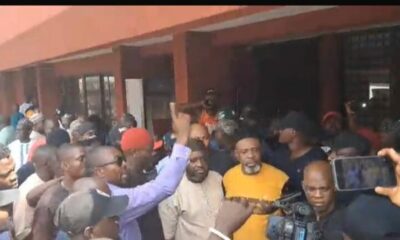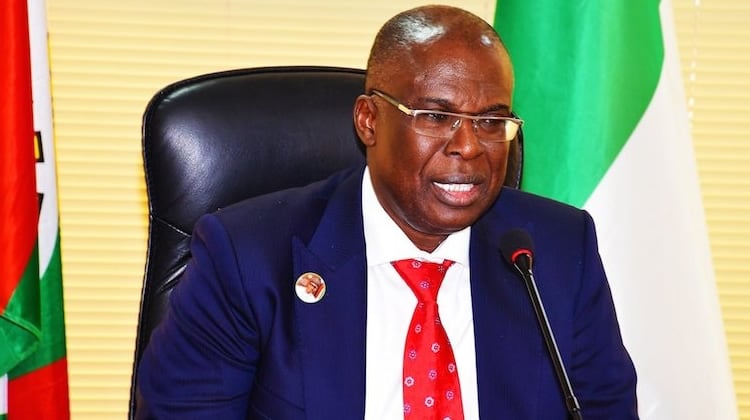As the country faces persistent blackouts, approximately 250 manufacturers and academic institutions have opted to leave their respective power distribution companies and generate their own electricity.
These organisations, many of which are major electricity consumers, have turned away from the national grid to produce more reliable power for themselves.
This shift comes amid rising electricity costs, fuel price increases, frequent grid collapses, and line trippings.
In 2021, former President Olusegun Obasanjo abandoned the national grid to launch a two-megawatt solar power project at the Olusegun Obasanjo Presidential Library in Abeokuta, Ogun State.
The project, which cost around N2bn at the time, was hailed by the former President as an exceptionally cost-effective investment.
Research from various data sources, particularly the Nigerian Electricity Regulatory Commission, revealed that these firms have collectively generated up to 6,500 megawatts of electricity.
This amount exceeds the country’s current power generation, which ranges between 4,500MW and 5,000MW.
Further findings by our correspondent indicated that these outlets got permits from the NERC to generate captive power. Some permits were issued as far back as 2010, 2016, 2020, and 2022.
It was learned that the request for captive power generation increased since 2023, especially after President Bola Tinubu signed the Electricity Act 2023.
Captive power generation permits are issued to entities that intend to own and maintain power plants exclusively for their consumption. That means the entities are not allowed to sell electricity generated from the plant to any third party.
While some of the plants use gas as feedstock, many embrace the use of renewable energy sources like solar.
One of the biggest captive power generators is the Dangote Group.
Dangote Industries Limited has generated about 1,500MW of electricity, according to Aliko Dangote. The Dangote refinery alone has a 435MW power plant that can meet the total power requirement of the Ibadan Electricity Distribution Company.
“We don’t put pressure on the grid. We produce about 1,500 megawatts of power for self-consumption,” Aliko Dangote said last year at the Afreximbank Annual Meetings and AfriCaribbean Trade & Investment Forum in Nassau, The Bahamas.
According to data sourced from NERC, 249 firms and institutions were granted permits to generate captive power.
The quantum of power generated by these organisations is approximately 5,180MW.
When this is added to the 1,500MW generated by the Dangote Group, it would amount to over 6,500MW being generated by the companies and learning institutions.
According to NERC, Pure Flour Mills Limited in Rivers State got a permit to generate 546MW of electricity while Nigeria LNG generates 360MW.
United Cement Company of Nigeria Limited (Lafarge Africa Limited) generates 105MW; Total E & P Nigeria Limited, 174MW; Esso Exploration & Production Nigeria Limited, 76MW; First Global Commerce Solutions Limited, 77MW; Flour Mills of Nigeria Plc, 70MW; and Lafarge Cement Wapco Nigeria Plc, 90MW.
Some of the companies include MTN Nigeria, the Nigerian National Petroleum Company Limited, Shell, Nigerian Breweries Plc, Flour Mills of Nigeria Plc, Mobil Producing Nigeria Unlimited, Kaduna refinery, Warri refinery, Lafarge Cement Wapco Nigeria Plc, Procter and Gamble Nigeria Limited, and Bank of Industry Ltd.
Others include Seven-Up Bottling Company Plc, First Bank of Nigeria Plc, Dangote Cement Plc, Lekki Port LFTZ Enterprise Limited, Guinness Nigeria Plc, Chevron Nigeria Limited, Nestle Nigeria Plc, Total Upstream Nigeria Limited, Aluminium Smelter Company of Nigeria, De-United Foods Industries Limited, Sagamu Steel Nigeria Limited, British American Tobacco Nigeria Limited, Unilever Nigeria Plc, Total E & P Nigeria Limited, and Mikano International Limited.
They also include Federal Airports Authority of Nigeria, Airtel Networks Limited, Nogap Power Development Company Limited, Shell Exploration & Production Company Limited, Esso Exploration & Production Nigeria Limited (Usan OML 138), Indorama Eleme Petrochemicals Limited, Cadbury Nigeria Plc, Honeywell Flour Mills, Atlantic International Limited Refinery & Petrochemical Limited, Julius Berger Nigeria Plc, Okamu Oil Palm Company, PZ Cusson Nig Plc, among others.
Among the universities with captive power are the University of Lagos, Abubakar Tafawa Balewa University, Federal University Ndufu-Alike IKWO, Usmanu Danfodiyo University, Obafemi Awolowo University, Federal University of Petroleum Resources, Nnamdi Azikiwe University, Awka, Federal University of Agriculture, Makurdi, Bayero University, Kano, and University of Benin.
Others include University of Abuja, University of Calabar & Teaching Hospital, Cross River State, University of Agriculture Micheal Okpara, Umetuke, Abia State, University of Maiduguri & Teaching Hospital, Borno State, Federal University of Agriculture, Abeokuta Main Campus, Ogun State, and the Federal University Gashuwa, Yobe State.
The Nigerian Defence Academy, a military university based in Kaduna recently got NERC’s nod to generate 2.50MW of electricity.
Experts said the abandonment of the national grid by bulk users of electricity could spell doom for the paper sector.
The Minister of Power, Adebayo Adelabu, recently decried the rate at which bulk electricity consumers abandon the national grid to generate their own electricity.
Adelabu emphasised that grid connection as a power source is more reliable than captive power plants currently being used by bulk electricity consumers.
He regretted that despite generating over 5,155MW of electricity, the power distribution companies were not taking the power allocated to them to avoid incurring debt due to low recovery.
He said, “The majority of bulk electricity users, such as industries, are off the grid due to a lack of trust and confidence in the past. They now have their own captive power plants in their industries, which is more expensive.”
According to him, the continued use of captive power rather than grid connection is more expensive.
“The average cost of producing captive power is about N350 to N400 per kilowatt-hour for those connected to gas lines. For diesel it’s about N950 or N1,000,” he said.
He stated that efforts would be made to encourage the bulk users to return to the national grid.
“Once consumers and industries see the trust, the confidence, and the stability we are giving, they would be encouraged and reconnect to the grid for a cheaper source of power.
“We aim to attain the threshold of a new era in power delivery. The Federal Government is still focused on Vision 30-30-30. By 2030, we aim to achieve 30GW in the medium term, with renewable energy constituting 30 per cent and universal access in the long term. We must align on the principles guiding our activities and the strategies,” the minister stated.
Meanwhile, the Nigerian Electricity Regulatory Commission blamed power fluctuations for the migration of bulk users from the national grid.
The regulator in a recent report disclosed that fluctuations in grid voltage, including spikes, dips, flickers, and brownouts, could cause significant harm to consumers and result in substantial commercial losses.
It explained that extreme cases of voltage fluctuations, particularly at the distribution network level cause severe damage to industrial machines, prompting the industries to embrace captive power generation.
“To guarantee the quality of electricity delivered to end users, the Grid Code specifies a nominal system voltage of 330kV with a tolerance range of ±5 per cent (313.50kV to 346.50kV in the lower and upper bounds respectively).
“Fluctuations in grid voltage, including spikes, dips, flickers, and brownouts, can cause significant harm to consumers and result in substantial commercial losses. Extreme cases of voltage fluctuations, particularly at the distribution network level can cause severe damage to industrial machines, thereby compelling the industrial customers to seek alternative sources of power outside of the national grid,” the regulator confirmed.
The commission said it continued to engage with the Transmission Company of Nigeria and other stakeholders to ensure sustained efforts at keeping the system voltage within the limits contained in the grid code and thus providing a safe and reliable electricity supply to end users.
The Executive Director of PowerUp Nigeria, Adetayo Adegbenle, said it was a sad situation that over 200 companies have dumped the national grid.
According to him, these are the companies that should have been serving as “anchor tenants” to ensure the country has a stable grid.
“Many of the grid collapses we have had can easily be also traced to such consumers leaving the grid, making the demand end of the grid less stable. I have also said before that one of the major objectives, if I were to be in charge of the grid, would be to bring these companies back if we truly want to have a stable and cheaper grid supply.
“The national grid system we operate is demand and generation-based. The demands and generation at any point must be equal, to balance the Frequency at 50hz, else frequency variation will be high. Having as many as 200 companies with high capacity demand leave the national grid means that the demand side is heavily dependent on other “mostly residential consumers.
“The whole power sector should be tasked with bringing these companies back, offering incentives. Bringing them back will also ensure that prices can go down on the grid,” Adegbenle said.
On whether the country can generate enough to serve these bulk users of electricity, he said the country still has stranded power not utilised.
“We still have stranded generations, we still have capacities available that they can consume. Generation companies can easily ramp that up too. The major problem in the power sector is liquidity and the cost-reflective tariff, which has stunted the growth of the sector. No incentive for targeted investments,” he explained.
Adegbenle added that it will be cheaper for the customers “because grid prices will definitely come down.”
Similarly, the President of the Nigeria Consumer Protection Network, Kola Olubiyo, argued that the Nigerian electricity grid has increasingly been frustrating, predictably unreliable, and unstable.
According to him, the incessant line trippings and system collapses have, over the years, made it inevitable for industries involved in the production and manufacturing of goods, who had hitherto depended on the national grid, to think outside the box.
Olubiyo said, “The distortion in national grid frequency, voltage floating, and related concerns are of grave concern to every well-meaning patriotic Nigerian. Each time there are interruptions in electricity dedicated to production and manufacturing, it usually impacts negatively on production and does irredeemable damage to quality and output.
“Though at a higher cost of production, off-grid renewable, embedded generation or captive island model provided in off-grid concepts offers the manufacturers and organised private sector an open window to enhance global competitiveness, with guaranteed energy security—that’s 24/7 energy supply,” Olubiyo submitted.
He added, “The effects of all of these on electricity distribution companies will be the promotion of an open market and competitive electricity market as against the increasing entrenchment of market monopoly as presently constituted, which are at variance with the spirits and letters of power sector privatisation exercise.
“The latest development thereby reflects the desires of the critical stakeholders driving the process to take unprecedented bold steps. They should deserve our support. It is the new normal and the way to go.”
The Coordinator, All Electricity Consumers Protection Forum, Adeola Samuel-Ilori, commended the manufacturers for seeking alternative power for their businesses.
Samuel-Ilori maintained that the issue of companies pulling out of the grid and providing power supply for themselves has been long since the privatisation of the sector.
“I know of Cadbury and Coca-Cola providing power for themselves, pulling out of DisCos service for the past five or six years now. That they have reached a whopping number of over 200 is a good thing as far as I’m concerned and from the prism of a consumer advocate.
“The service being given by the service providers registered by the NERC are not meeting their needs, they still buy diesel to support the supply and the monthly bill eats deep into their profit margins, hence it is wise for them to do so,” Samuel-Ilori stressed.
Like the Discos and other stakeholders in the power sector, Samuel-Ilori posited that the manufacturers and other institutions are also out to make a profit and meet the overhead cost of their respective businesses, “Hence one Disco can’t be reaping where the correspondent supply is not adequate.“
He said, “I can tell for free that what makes many companies join those who already did was the introduction of Band A and its attendant cost per unit which I called fraudulent because there’s no generated power to sustain the introduction and fulfill the demand of the customers migrated. So, any companies migrated will end up closing up business without blinking as the DisCos charge as much as N5 million for a small-scale business and entrepreneurs, not to talk of the big companies.
“On its effect on the national grid, it will relieve the national grid capacity absolvement since we all know it’s common knowledge that national grid equipment is moribund which led to its constant collapse almost at every Eke market day including Saturday. Forget the alibi given by TCN that it was not a collapse but a trip-off from one substation. It was such a tripping that led to the grid collapsing ab initio.”
Samuel-Ilori advocated that individuals should join the firms in generating their own electricity.
“For me, it’s not only the companies that should move from the grid due to the experience of its collapses to reduce the load capacity, many individual homes should be encouraged to do so because when that happens, many transformers will be relieved and the incident of trip-offs in the substations will reduce and that will automatically reduce the cases of national grid collapses.
“It is not rocket science to know that renewable energy ought to be an alternative source for anyone who desires to have an energy supply, but in Nigeria, the power stakeholders are paying lip service to it just to continue feeding their hawk in the DisCos business. That’s why the materials used for alternative energy production are expensive, so the poor won’t have access to them.
“I have said many times at meetings with NERC and even the power minister as National coordinator, that if they want renewable energy to grow, and to become the real alternative to grid power supply, just as they give waivers on health materials and other allied products, let them reduce the import duty if they can’t give waivers to those importers so we can have access to inverters and other materials used in providing alternative power supply. That alone will help the national grid pending the time they will put it in good condition to accommodate all users,” he noted.
The consumer protector mentioned that the Discos will survive despite the companies changing their supply base as they continue to collect money from consumers on estimated billing.
“Their cash cow where they milk money without working for it is still very much in operation against the larger consumers out there, which is estimated billing. As long as the Discos have access to free money from the consumers via estimated billing, they won’t blink at how many companies pull out of their franchise area of the network.
“That’s why they frustrate every move to get us metered. Do you know some of the Meter Asset Providers are also owned by the Discos? That’s why meters are not always available for purchase even when customers are readily and willing to buy. Many have paid for over six months now and have not got it. For those that are metered today, tomorrow or next, the meter refuses to load and the message from DisCo will be ’let’s connect you directly’, and they are back to square one of estimated billing while the meter won’t be repaired or replaced as the law of operation dictates,” he alleged.
The analyst argued that captive power is the best way to go as far as the situation of Nigeria’s power remains at 4500MW to serve over 200 million Nigerians.
He disclosed that the companies are ready to pay for power but the power is not readily available, yet Discos still billed them monthly humongous amounts for what they did not consume.
“That’s why I opined above that it’s not only companies that should adopt the system of renewable energy but individuals, and the government should make it attractive by reducing tax, customs duty, or even waiver on the materials used to provide such so that the poor masses with interest on changing their source of supply can access it seamlessly within their purchasing power.
“And in the end, help relieve the load on the national grid to stop its incessant collapses pending the time they will invest money to change this moribund equipment to sustain the capacity,“ he emphasised.
Credit: The Punch

 BIG STORY4 days ago
BIG STORY4 days ago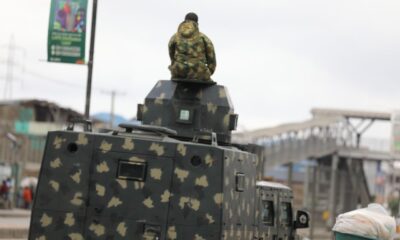
 BIG STORY3 days ago
BIG STORY3 days ago
 BIG STORY6 hours ago
BIG STORY6 hours ago
 BIG STORY3 days ago
BIG STORY3 days ago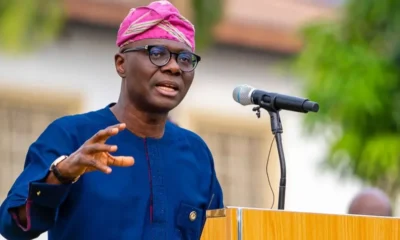
 BIG STORY4 days ago
BIG STORY4 days ago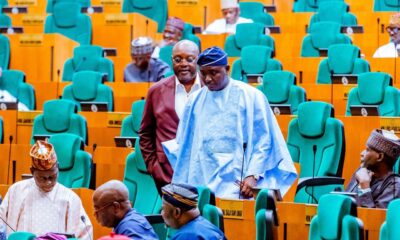
 BIG STORY4 days ago
BIG STORY4 days ago
 BIG STORY10 hours ago
BIG STORY10 hours ago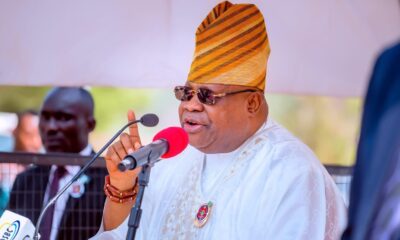
 BIG STORY4 days ago
BIG STORY4 days ago









